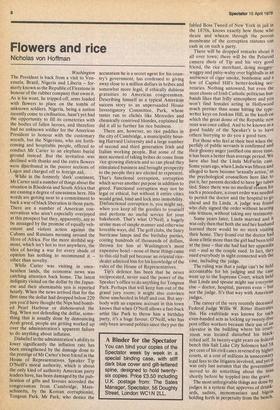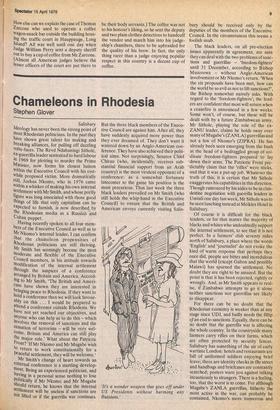Flowers and rice
Nicholas von Hoffman
Washington The President is back from a visit to Venezuela, Brazil, Nigeria and Liberia — formerly known as the Republic of Firestone in honour of the rubber company that owns it. As is his wont, he tripped off, arms loaded with flowers to place on the tombs of unknown soldiers. Nigeria, being a nation recently come to civilisation, hasn't yet had the opportunity to fill its cemeteries with the bodies of fallen heroes, and therefore . had no unknown soldier for the American President to honour with the customary wreath, but the Nigerians, who are forthcoming and hospitable people, offered to conduct Mr Carter to an elephant burial ground instead. But the invitation was declined with thanks and the extra flowers were distributed in the poorer sections of Lagos and charged off to foreign aid.
While in the formerly 'dark' continent, Mr Carter said a number of things about the situation in Rhodesia and South Africa that are causing a degree of uneasiness here. His words are getting near to a commitment to back a war of black liberation in those parts. There are a number of American conservatives who aren't especially overjoyed at this prospect but they, apparently, are to be assuaged by the promise of equally vehement and violent action against the Cubans and Russians messing around the Horn of Africa. ,For the more slothful segment, which isn't hot to trot anywhere, the idea of having a war for every shade of opinion has nothing to recommend it — other than novelty.
While Carter was visiting in once
heathen lands, the economic news was catching attention back home. The latest indignity visited on the dollar by the Japanese and their abominable yen is reported hourly. When the news arrived that for the first time the dollar had dropped below 220 yen you'd have thought the Nips had bombed Pearl Harbour or dishonoured the flag. When not defending the dollar, something that is usually done by denouncing Arab greed, people are getting worked up over the administration's apparent failure to do anything about inflation.
Disbelief in the administration's ability to lower significantly the inflation rate has been strengthened by the damage done to the prestige of Mr Carter's best friend in the House of Representatives. Speaker Tip O'Neill's moral authority, which is about the only kind of authority American party leaders have, has been damaged by the pub lication of gifts and favours accorded the congressman from Cambridge, Massachusetts, by the Korean corruptionist, Tongsun Park. Mr Park, who denies the accusation he is a secret agent for his country's government, has confessed to giving away close to a million dollars in bribes and somewhat more legal, if ethically dubious gratuities to American congressmen. Describing himself as a typical American success story to an unpersuaded House Investigatory Committee, Park, whose tastes run to clichés like Mercedes and chemically contrived blondes, explained he did it all to further his rice business.
There are, however, no rice paddies in the city of Cambridge, a municipality housing Harvard University and a large number of second and third generation Irish and Italian working people. But some of the men accused of taking bribes do come from rice-growing districts and so can plead they stimulated business and brought prosperity to the people they are elected to represent. That's functional corruption, corruption which serves another purpose in addition to greed. Functional corruption may not be legal or ethical, but without it entire cities would grind, bind and lock into immobility. Disfunctional corruption is, you might say, when you keep all the goodies to yourself and perform no useful service for your baksheesh. That's what O'Neill, a hugely ursine man of simple manner and otherwise loveable ways, did. The golf clubs, the fancy hurricane lamps and the birthday parties, costing hundreds of thousands of dollars, thrown for him at Washington's most expensive hotel — none of these things came to this old bull pol because an oriental ricedealer admired him for his knowledge of the rules of the House of Representatives.
Tip's defence has been that he never reciprocated, never used the power of the Speaker's office to do anything for Tongsun Park. Perhaps that will keep him out of the grand jury room; it might also convince those unschooled in bluff and con. But anybody with an expense account in this town knows that when O'Neill allows a fast-buck artist like Park to throw him a birthday party, it's a huge favour. O'Neill, who has only been around politics since they put the fabled Boss Tweed of New York in jail in the 1870s, knows exactly how those who sleaze and wheeze through the porous membrane of the corruption statutes can cash in on such a party. There will be dropped remarks about it all over town; there will be the Polaroid camera shots of Tip and his very good friend, the rice merchant, doing muggsywuggsy and palsy-walsy over highballs in all
ambience of cigar smoke, bonhomie and a few of Capitol Hill's better-looking secretaries. Nothing untoward, but even the most chaste of Irish Catholic politician husbands likes that frilly atmosphere and you won't find females acting in Hollywood much prettier than some hitting the typewriter keys on Jenkins Hill, as the knob on which the great dome of the Republic now rests was once called. And to be known as a good buddy of the Speaker's is to have others hurrying to do you a good turn.
For those who feel at their best when the perfidy of public servants is confirmed and their gloomy anger justified one more time, it has been a better than average period. We have also had the Linda McFarlin case. Some years ago, when Linda was fifteen and alleged to have become 'sexually active,' as the psychological counsellors here like to put it, her parents decided to have 4er tubes tied. Since there was no medical reason for such a procedure, a court order was needed to permit the doctor and the hospital to go ahead and fix Linda. A judge was found who duly signed the order without hearing one witness, without taking any testimonY• Some years later, Linda married and it was only then that both she and her husband learned there would be no stork visiting their home. They found out the doctor had done a little more than the girl had been told at the time — that she had had her appendix out — and so the couple sued. In fact, they sued everybody in sight connected with the case, including the judge.
The ruling was that a judge can't be held accountable for his judging and the case went up to the Supreme Court, which held that Linda and spouse might sue everyone else — doctor, hospital, parents even — but not the judge. It's that way with American judges. The career of the very recently deceased Federal Judge Willis W. Ritter illustrates this. His exaltitude was known for such even-handed acts as locking up twenty-five post office workers because their use of an
elevator in the building where his courtroom was located disturbed his black'
robed self. In twenty-eight years on federal bench this Salt Lake City Solomon had 58 per cent of his civil cases reversed oy higher
courts, at a cost of millions in unnecessary legal fees to the litigants involved, and yet It was only last autumn that the government moved to do something about the men shortly before he toppled into the grave. The most unforgivable things are done by judges in a system that approves of drunk
ards, sadists, monomaniacs and bigots holding forth in perpetuity from the bench. How else can we explain the case of Thomas Zarcone who used to operate a coffee wagon-snack bar outside the building housing the traffic court in Hauppauge, Long Island? All was well until one day when Judge William Perry sent a deputy sheriff out to buy a cup of coffee from Mr Zarcone. (Almost all American judges believe the lesser officers of the court are put there to be their body servants.) The coffee was not to his honour's liking, so he sent the deputy and two plain clothes detectives to handcuff the vendor and march him into his judgeship's chambers, there to be upbraided for the quality of his brew. In fact, the only thing rarer than a judge enjoying popular respect in this country is a decent cup of coffee.



































 Previous page
Previous page